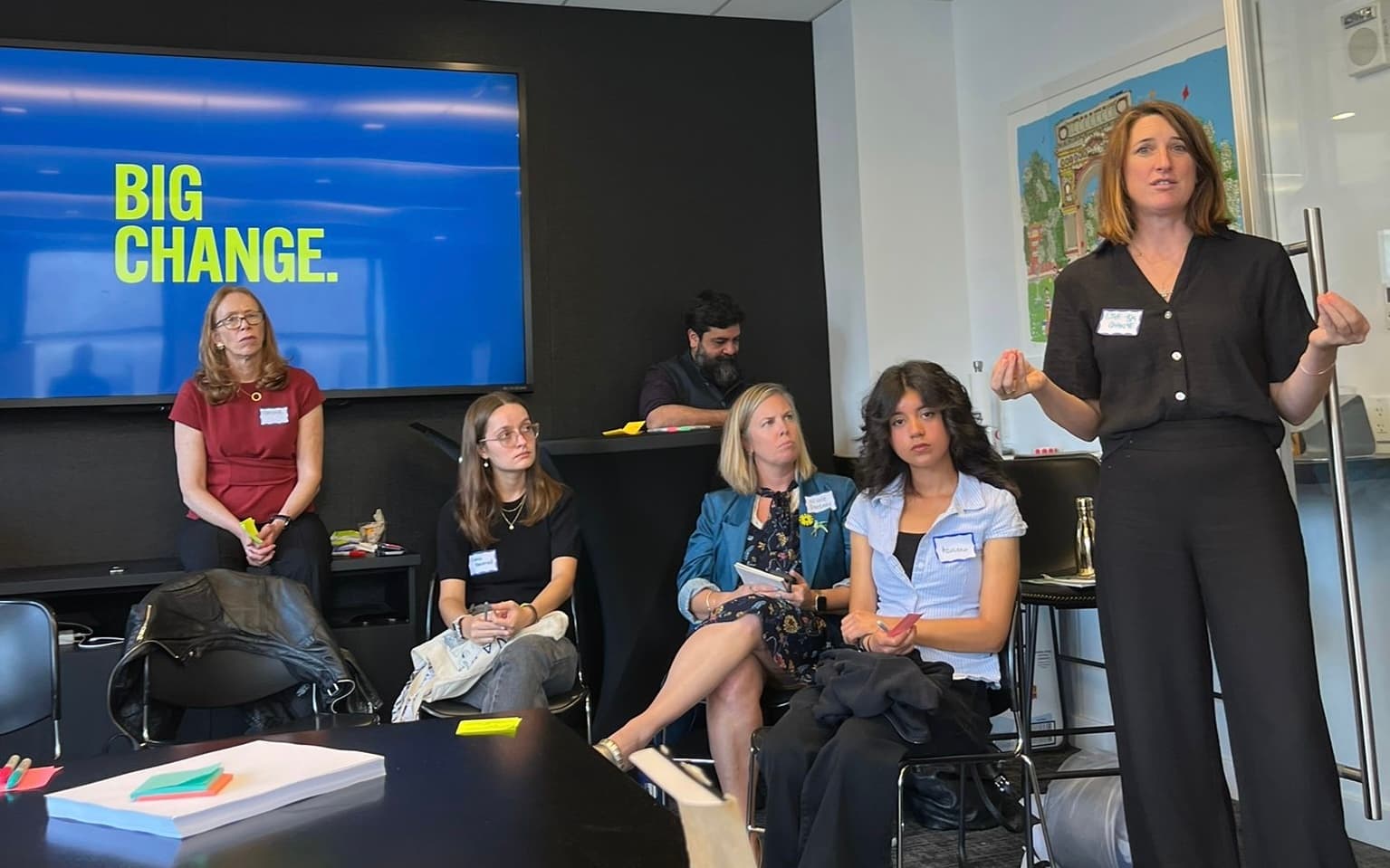
The Power of Hope
How I faced my demons to spark a movement for wellbeing for young people. Blog By Andrew Speight, founder of Big Change funded project Emoco.

I swore I’d never return to my old school. When I was there, I experienced very poor mental health due to a high-pressure environment where it felt that I’d be doomed to destitution if I failed my GCSEs, and a positive future felt out of reach. It felt as though there was no hope.
Yet that experience also built empathy for others who might be going through the same kind of toxic stress that I was. And, from empathy, springs a desire to act to help others.
Against all my expectations, I returned to lead a new project, Emoco.
The memories were raw: the anxieties, the trauma, the survival instincts I had felt in years gone by.
As I sat in reception I remembered sitting there just a few years earlier waiting for my mum to take me out to mental health appointments, to get help. I remember the evening of my Year 11 celebration assembly just after my GCSEs. I was there for five minutes and had to leave. I couldn’t handle being there. I didn’t even attend my GCSE results day; my mum collected my results.
Even the school bell triggered something. When I heard it ring through reception, my body jolted. The sound carried something old. But I was no longer in that story.
I was there to begin a new story, one called Emoco.
Emoco began as a collective response to the concerns of stakeholders in Blackpool about how poor mental health and well-being was impacting the education system - at all levels. I was part of an intergenerational working party pulled together by the Blackpool Education Improvement Board (BEIB) to compose a response to these concerns. This led to Emoco which is built on a deep belief that when young people are actively involved in shaping their school experience, they will shape a school they genuinely want to be part of .
Like me, most teachers and students believe that wellbeing at school shouldn’t be an add-on, but woven into everyday school life. Young people are clear that the status quo isn’t working for them. They want to be active agents, having a positive influence on their schools and their communities. They want to be heard and their voices to have a real impact. Teachers and parents and carers want to work alongside students, breaking down barriers and building a community where mental health is valued as much as grades.
Through Emoco I aim to inspire key school stakeholders, young people, teachers, parents, carers, and school leaders, to come together to create a culture of wellbeing. This means recognising mental wellbeing as intrinsic to academic success and embedding it across the practices and policies that make up a school.
This time I was waiting to go into school to begin a new journey, one where I got to help improve the mental health of the entire school community. I was calm, at ease, because I was there to finish the work I’d started as a pupil council member and make sure others didn’t have to go through what I did. I was grounded in a strong sense of purpose.
The shift was profound, and much needed in my hometown, Blackpool.
Blackpool faces some of the greatest deprivation in the country. According to the English Indices of Deprivation (2019), eight out of the ten most deprived wards in England are located in Blackpool.
As a coastal town, Blackpool faces the challenge of an insecure, seasonal economy that is based on tourism. This economic insecurity, in turn, gives rise to all sorts of challenges. According to estimates from the Office for Health Improvement and Disparities (OHID) and the UK Health Security Agency (UKHSA) in 2019/20, prevalence of opiate and crack cocaine use in Blackpool was estimated to be 28.6 per 1,000 population, compared to 9.5 per 1,000 for England and 11.9 per 1,000 for the North West JSNA data reveals that Blackpool has high levels of alcohol-related harm (health, disorder, and violence) for the size of the population, and I know from the most recent run of the UK Youth Parliament’s “Make Your Mark” consultation in Blackpool - as well as multiple other forms of engagement - that, along with educational stressors, crime and safety is one of the biggest worries for young people in Blackpool. According to the 2021 Census, Blackpool faces an oversupply of poor-quality, one-person accommodation and limited choice of family housing, as evidenced by some of the lowest house prices in the country.
We know from national research - such as consecutive Good Childhood Reports, the Jacobs’ Foundation’s Children’s World Report, and the broader “Make Your Mark: Understanding our Communities” report I worked on during my time with the UK Youth Parliament - that the high-pressure, high-stakes nature of the education system is one of the primary determinants fuelling the fire of the youth mental health epidemic. Now, taking into account the high level of baseline stress young people in Blackpool feel for all the reasons cited, the impact of stress coming in the education system will be even more acute and profound for young people here than it will in other parts of the country, yet another health inequality.
Emoco creates a space where young people can reclaim hope, speak up, feel heard, and start healing.
Through my work helping young people overcome the barriers they face, I’ve learned that hope is as essential as oxygen or water. Earlier this year, I took a youth mental health first aid course. The trainer, who works with young people in A&E, explained to us how hope is essential for people to keep going in life. It is when people run out of hope that lives are in danger and, very sadly, tragedies occur.
One of the proudest outcomes of Emoco so far has been supporting my old school to put on a production of Matilda. After the Emoco student group identified increased access to the arts and creative opportunities as a priority for embedding a culture of well-being, staff used it to secure funding to put the show on. The results have been profound: one student who had been selectively mute chose to join in and has found their voice.
Pupils told me the impact being in this production had on their wellbeing
The pupils will carry their confidence and friendships with them for years to come.
The school is gearing up for next year’s production, showing that the commitment is there to sustain this work. This demonstrates how entrusting ownership of change to schools leads to a lasting impact, validating the approach adopted by the BEIB’s Working Party. It’s their story. Their success. They want to see it through as it is their endeavour.
Matilda is just one outcome of Emoco’s wider work. Students are also running wellbeing surveys, facilitating open conversations between students and staff, and driving real change as they grow in confidence. Emoco is turbocharging intergenerational collaboration and breaking down the barriers to change in schools to ensure the voices of everyone who contributes are really heard, and that’s what makes it unique.
Powered by Big Change
Big Change has been a powerful partner in my work. They didn’t arrive with a fixed agenda or a prescriptive model. Instead, they asked the most important question: “What do you need to make this possible, and how can we help remove the barriers?”
They didn’t just fund a project, they validated a vision. They helped me see Emoco not just as a temporary programme that gets one run-of-the-mill and then dissipates into nothing, but as a potential social enterprise: something that could scale, deepen, and become part of reimagining education and belonging in Blackpool - and beyond!
They asked, “What do you believe in?” That kind of trust changed everything for me.
With their support, I was able to grow Emoco beyond one school. Their belief in the work gave me the space to innovate, to listen deeply, and to build the foundations for real, systemic change.
But what stands out even more is the community Big Change creates. I often call it my Big Change family, and I don’t use that word lightly. I’m quite introverted, often reclusive. But this community truly feels like a warm collective. It gives you a sense of belonging.
Big Change backs the messy, beautiful, people-powered parts of transformation, the kind that starts with relationships, not just metrics. Big Change focuses on those projects that go upstream and tackle the problem at the source, not sticking-plaster solutions.
Coming full circle, from the depths of trauma to leader in the school community has given my life meaning and purpose.
I often say, what I went through wasn’t in vain, the school and the world are better for it. And without a doubt it’s been life changing for me.

